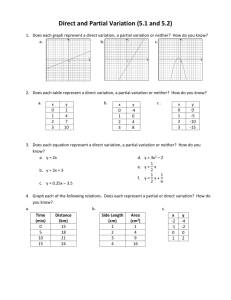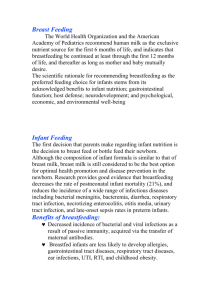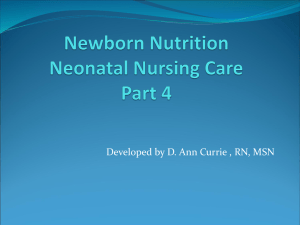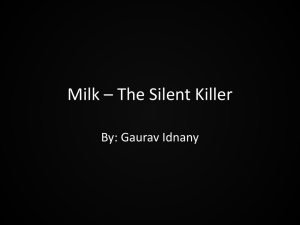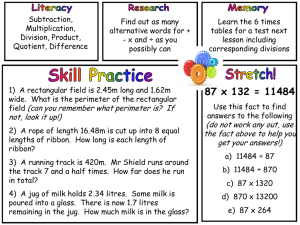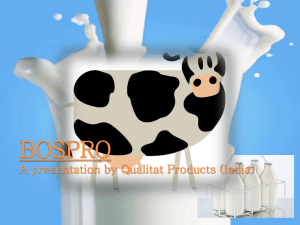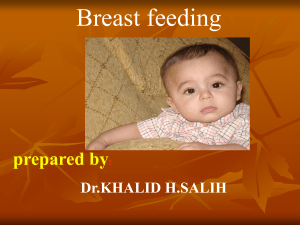3rd Meeting of the IYCF_Dec 6
advertisement
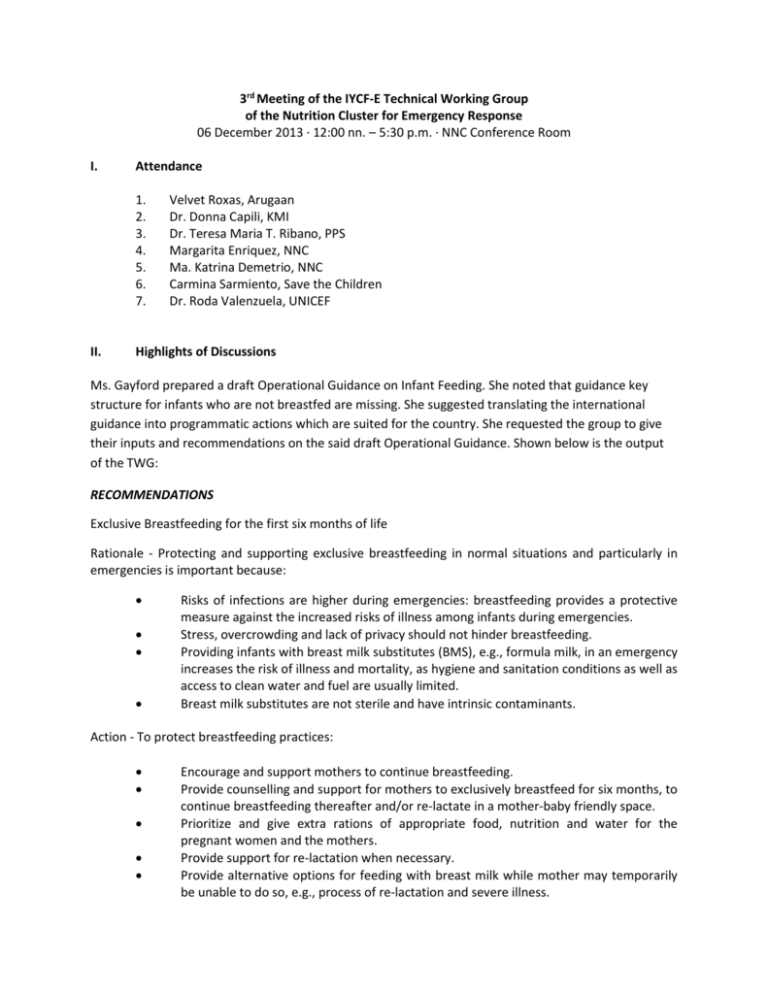
3rd Meeting of the IYCF-E Technical Working Group of the Nutrition Cluster for Emergency Response 06 December 2013 ∙ 12:00 nn. – 5:30 p.m. ∙ NNC Conference Room I. Attendance 1. 2. 3. 4. 5. 6. 7. II. Velvet Roxas, Arugaan Dr. Donna Capili, KMI Dr. Teresa Maria T. Ribano, PPS Margarita Enriquez, NNC Ma. Katrina Demetrio, NNC Carmina Sarmiento, Save the Children Dr. Roda Valenzuela, UNICEF Highlights of Discussions Ms. Gayford prepared a draft Operational Guidance on Infant Feeding. She noted that guidance key structure for infants who are not breastfed are missing. She suggested translating the international guidance into programmatic actions which are suited for the country. She requested the group to give their inputs and recommendations on the said draft Operational Guidance. Shown below is the output of the TWG: RECOMMENDATIONS Exclusive Breastfeeding for the first six months of life Rationale - Protecting and supporting exclusive breastfeeding in normal situations and particularly in emergencies is important because: Risks of infections are higher during emergencies: breastfeeding provides a protective measure against the increased risks of illness among infants during emergencies. Stress, overcrowding and lack of privacy should not hinder breastfeeding. Providing infants with breast milk substitutes (BMS), e.g., formula milk, in an emergency increases the risk of illness and mortality, as hygiene and sanitation conditions as well as access to clean water and fuel are usually limited. Breast milk substitutes are not sterile and have intrinsic contaminants. Action - To protect breastfeeding practices: Encourage and support mothers to continue breastfeeding. Provide counselling and support for mothers to exclusively breastfeed for six months, to continue breastfeeding thereafter and/or re-lactate in a mother-baby friendly space. Prioritize and give extra rations of appropriate food, nutrition and water for the pregnant women and the mothers. Provide support for re-lactation when necessary. Provide alternative options for feeding with breast milk while mother may temporarily be unable to do so, e.g., process of re-lactation and severe illness. 3rd Meeting of the IYCF-E Technical Working Group 06 December 2013 ∙ 12:00 nn. – 5:30 p.m. ∙ NNC Conference Room Find among population groups lactating women willing to breastfeed orphans or unaccompanied infants and also to donate human breast milk for collective pooling and pasteurization with existing human milk banks. Establish strategically located drop off and storage points of expressed and/or donated human breast milk. Form support groups with mothers experienced in breastfeeding and mobilize trained peer counsellors to support all mothers and pregnant women. For pregnant women about to give birth, ensure that the time bound steps of Essential Intrapartum and Newborn Care protocol are performed during the time of labor and delivery to ensure early initiation of breastfeeding. Provide information on the importance of breastfeeding and proper nutrition with complementary feeding, and risks of artificial milk feeding. Prohibit the generalized distribution of BMS and feeding bottles, teats and pacifiers. Breast milk substitutes can be considered as the last option when wet nursing is not possible and there are no women to provide expressed breast milk nor pooled donor human breast milk that can be provided to the infant. Specialized care and prescribed feeding for cases of inborn errors of metabolism Guidelines to follow for breast milk substitutes in emergencies – according to Executive Order No. 51 and its revised IRR and in reference to the World Health Assembly resolutions: A general distribution should NEVER include breast milk substitutes or any other milk products. BMS should only be provided to infants who do not have access to wet nursing and there are no women to provide expressed breast milk nor pooled donor human breast milk that can be provided to the infant. Individual case assessments should be conducted by health or IYCF staff at health facilities who have received training in infant and young child feeding. Government and organizations must NEVER accept unsolicited donations of ANY milk products. The milk product should conform to the Codex Alimentarius standards for labelling in the appropriate language according to the International Code of Marketing of Breast Milk Substitutes. BMS should not be in their original packaging as here should be no branding of the BMS, container shall not be bent, opened or exposed to the elements and free from any damage and the expiration shall not be less than 12 months from the date of delivery to DOH. All donated BMS and milk products shall require the approval of the Department of Health, regardless of the intended age group. There should be no private donations of BMS and/or milk products. There should be no generalized distribution of BMS and milk products at any point in time. There shall be no promotion of BMS and milk products, including any forms of advertisement and financial or material inducement. In exceptional cases when there is no access to wet nursing and donor breast milk and use of infant formula is the last resort of feeding. All BMS and/or milk products shall be maintained in safekeeping with the government health workers who will account for them and dispense according to the individualized needs assessment of potential recipients. 2 3rd Meeting of the IYCF-E Technical Working Group 06 December 2013 ∙ 12:00 nn. – 5:30 p.m. ∙ NNC Conference Room Dispensing of BMS/milk products, upon assessment of individualized needs, will follow these guidelines: o o o o There will be centralized provision of BMS/milk products. Preparation of BMS and/or milk products will be done by the government health worker assigned in the area. There should be clean and potable water available at all times, with clean feeding cups. For as long as the infant requires BMS, the government will continue to provide and dispense it as well as monitor the nutritional and health status of the infant. The use of infant feeding bottles and artificial teats in emergency settings should be actively discouraged. The donation of BMS/milk products if requested and approved by the Department of Health shall cease with the official lifting of Presidential Proclamation declaring the nation in the state of calamity. III. Action Lines 1. To submit inputs and comments on the Operational Guidance on Infant Feeding on 07 December 2013 at 1 PM. 2. To confer with Dr. Anthony Calibo if there is a need for experts for the IYCF-E TWG. Prepared by: Margarita D.C. Enriquez Nutrition Officer II, NNC Noted by: Dr. Anthony Calibo Chair, IYCF-E Working Group National Nutrition Cluster 3

